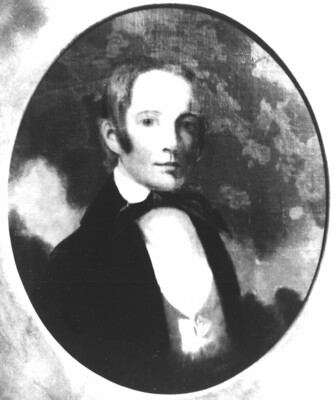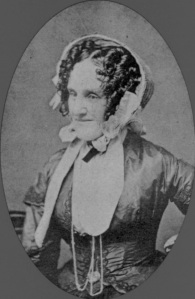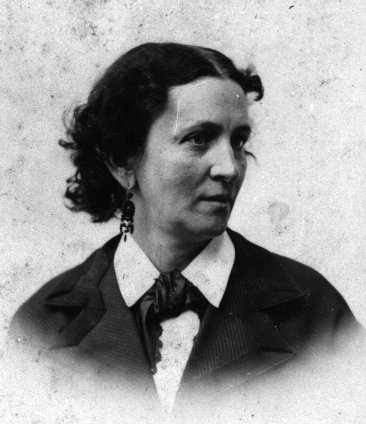Devereux, Thomas Pollock
17 Nov. 1793–7 Mar. 1869
 Thomas Pollock Devereux, lawyer and planter-enslaver, was born at New Bern, the oldest of the three children of John (1761–1844) and Frances Pollock Devereux (1771–1849). John Devereux, a native of Ireland, was a former lieutenant in the British navy. Shipwrecked off the North Carolina coast near New Bern, he had remained in that city where he continued the mercantile business he had previously entered in Charleston, S.C.; he became the owner of a fleet of ships that traded between Boston, Mass., and Barbados. Frances Pollock Devereux, a native of New Bern, was a daughter of Eunice Edwards Pollock (1743–1822), the seventh daughter and eighth child of theologian Jonathan Edwards (1703–58), and of Thomas Pollock III (d. 1777), grandson of Thomas Pollock of Balgra (1654–1722), a native of Glasgow, Scotland, who came to North Carolina about 1700 and twice (1712–14 and 1722) served as acting governor of proprietary North Carolina. Thomas Pollock Devereux's sister, Frances, was the wife of Leonidas Polk (1806–64), Episcopal bishop of Louisiana and lieutenant general in the Confederate Army. Through the second marriage (1800) of his grandmother, Eunice Edwards, to a Mr. Hunt, Devereux was a half-cousin of Thomas Pollock Burgwyn.
Thomas Pollock Devereux, lawyer and planter-enslaver, was born at New Bern, the oldest of the three children of John (1761–1844) and Frances Pollock Devereux (1771–1849). John Devereux, a native of Ireland, was a former lieutenant in the British navy. Shipwrecked off the North Carolina coast near New Bern, he had remained in that city where he continued the mercantile business he had previously entered in Charleston, S.C.; he became the owner of a fleet of ships that traded between Boston, Mass., and Barbados. Frances Pollock Devereux, a native of New Bern, was a daughter of Eunice Edwards Pollock (1743–1822), the seventh daughter and eighth child of theologian Jonathan Edwards (1703–58), and of Thomas Pollock III (d. 1777), grandson of Thomas Pollock of Balgra (1654–1722), a native of Glasgow, Scotland, who came to North Carolina about 1700 and twice (1712–14 and 1722) served as acting governor of proprietary North Carolina. Thomas Pollock Devereux's sister, Frances, was the wife of Leonidas Polk (1806–64), Episcopal bishop of Louisiana and lieutenant general in the Confederate Army. Through the second marriage (1800) of his grandmother, Eunice Edwards, to a Mr. Hunt, Devereux was a half-cousin of Thomas Pollock Burgwyn.
In 1813 Devereux was graduated from Yale College, where he was a schoolmate of George E. Badger (1795–1866), later a prominent North Carolina lawyer and politician, and Elisha Mitchell (1793–1857), who would become a distinguished professor of mathematics and science in The University of North Carolina. Both men became Devereux's lifelong friends. Devereux chose the law as his profession but for some years did not actively seek clients because he already had a competent fortune. Business reverses, however, eventually compelled him to devote his full energies to the duties of the bar. He soon attained both a large practice and a reputation for unusual legal ability, especially in equity cases. He was appointed U.S. attorney for the District of North Carolina and served competently in that position for many years. In 1826 he became joint reporter with George E. Badger of the North Carolina Supreme Court and soon was made the sole occupant of the post following Badger's resignation. Devereux produced four volumes of law and two volumes of equity reports. In 1834 he obtained the assistance of William Horn Battle in reporting the court's decisions.
 Devereux was influential in persuading William Gaston in 1833 to accept an appointment to the state supreme court. Though convinced of the continued need for the court, which had been created in 1818, he was aware that it was unpopular throughout the state. Devereux believed that it could be saved from abolition by the legislature only if a lawyer of Gaston's ability and prestige could be secured to fill the vacancy created by the death of Chief Justice John Louis Taylor in 1829.
Devereux was influential in persuading William Gaston in 1833 to accept an appointment to the state supreme court. Though convinced of the continued need for the court, which had been created in 1818, he was aware that it was unpopular throughout the state. Devereux believed that it could be saved from abolition by the legislature only if a lawyer of Gaston's ability and prestige could be secured to fill the vacancy created by the death of Chief Justice John Louis Taylor in 1829.
Upon the death of his uncle, George Pollock (1772–1839), Devereux inherited the care and management of a large family estate, consisting mostly of several plantations and the rights to enslave about fifteen hundred people. These duties forced him to abandon the legal profession, and he spent the remainder of his life in agricultural pursuits and such public service as he could render as justice of the peace and as a presiding justice of the county court of Halifax.
Devereux was married twice. His first wife, Catherine Ann Johnson of Connecticut, was a lineal descendant of Samuel Johnson (1696–1772), the first president of Kings College, New York City, and his son, William Samuel Johnson (1727–1819), the first president of Columbia University, the successor institution of Kings College. She was also related to the Bayard, Livingston, and other Knickerbocker families. Following Catherine Ann's death on 18 July 1836, Devereux married a Miss Maitland of New York who outlived him. The father of a numerous progeny, he was survived by one son and seven daughters as well as several grandchildren. His son John, an 1840 graduate of Yale College who served as North Carolina quartermaster during the Civil War, married Margaret Mordecai (1824–1910), a daughter of Moses Mordecai, a prominent Raleigh attorney. They were the parents of Thomas Pollock Devereux II, who served as a courier in the Confederate Army of Northern Virginia (1863–65) and whose letters to his parents and his sister (now in the State Archives in Raleigh) give detailed descriptions of army life and of the battles in which he participated.
 Devereux's daughter Frances was the wife of Henry W. Miller, Wake County lawyer and Whig leader, whom she married on 15 June 1837. Catherine Ann, her mother's namesake, who married Patrick M. Edmondston of South Carolina, kept a diary of her experiences as a North Carolina planter's wife during the Civil War; it reveals her to have been a well-educated, widely read woman of penetrating intelligence who was fond of playing chess with her father, the resident of a neighboring plantation. Another daughter, Mary Bayard Devereux Clarke, was a novelist and poet of note.
Devereux's daughter Frances was the wife of Henry W. Miller, Wake County lawyer and Whig leader, whom she married on 15 June 1837. Catherine Ann, her mother's namesake, who married Patrick M. Edmondston of South Carolina, kept a diary of her experiences as a North Carolina planter's wife during the Civil War; it reveals her to have been a well-educated, widely read woman of penetrating intelligence who was fond of playing chess with her father, the resident of a neighboring plantation. Another daughter, Mary Bayard Devereux Clarke, was a novelist and poet of note.
In his seventy-sixth year Devereux died at his plantation, Conneconara, on the Roanoke River in Halifax County. His remains were taken to Raleigh and interred in the City Cemetery. In politics he was a Whig. Although a staunch Unionist prior to the state's secession in 1861, he loyally supported the Confederate cause during the Civil War. Postwar emancipation liberated the enslaved people under Devereux, and these people were valued at around $750,000. From early life he was a communicant of the Episcopal church, though both his mother and his maternal grandmother were charter members of the First Presbyterian Church in New Bern and his mother gave money for the first Presbyterian manse in Raleigh. Apparently no portrait of Devereux exists. Portraits of his parents, his uncle, George Pollock, and his daughter-in-law, Margaret Mordecai Devereux, are reproduced in the North Carolina Portrait Index, 1700–1860 (1963).
References:
George Edmund Badger Papers, John Devereux Account Book, Margaret Mordecai Devereux Papers, Thomas Pollock Devereux Papers, William Gaston Papers (Southern Historical Collection, University of North Carolina, Chapel Hill).
Beth G. Crabtree and James W. Patton, eds., "Journal of a Secesh Lady": The Diary of Catherine Ann Devereux Edmondston, 1860–1866 (1979).
Edward Jones Hale Papers, Charles E. Johnston Collection, John Devereux Papers, Thomas Pollock Devereux Letter Book, Pollock Papers, Pollock-Devereux Papers (North Carolina State Archives, Raleigh).
James W. Patton, "Serious Reading in Halifax County, 1860–65," North Carolina Historical Review 42 (1965).
Raleigh Daily Standard, 10, 11 Mar. 1866.
L. C. Vass, History of the Presbyterian Church in New Bern, N.C. . . . (1886).
Additional Resources:
"Thomas Pollock Devereux." The Litchfield Ledger: A Database of Students of the Litchfield Law School and Litchfield Female Academy. Litchfield Historical Society. http://www.litchfieldhistoricalsociety.org/ledger/students/823 (accessed July 30, 2013).
Dexter, Franklin Bowditch. "Thomas Pollock Devereux." . Biographical Sketches of the Graduates of Yale College with Annals of the College History volume 6. New Haven: Yale University Press. 1912. 546-547. https://archive.org/stream/biographicalske00dextgoog#page/n444/mode/2up (accessed July 30, 2013).
Image Credits:
"N_93_8_47 Thomas Pollock Devereux." From the General Negative Collection, Courtesy of the State Archives of North Carolina. https://www.flickr.com/photos/north-carolina-state-archives/48038953023/ (accessed May 3, 2024).
"Catherine Ann Devereux Edmondston," Photo courtesy of Civil War Time Blog. Photo posted March 17, 2011, and is available at the Mordecai house in Raleigh, NC. Available online from http://civilianwartime.wordpress.com/2011/03/17/catherine-ann-devereux-edmondston/ (Accessed April 13, 2012).
"Mary Bayard Clarke, ca. 1870s." Photo courtesy of NC Museum of History.
1 January 1986 | Gass, W. Conard